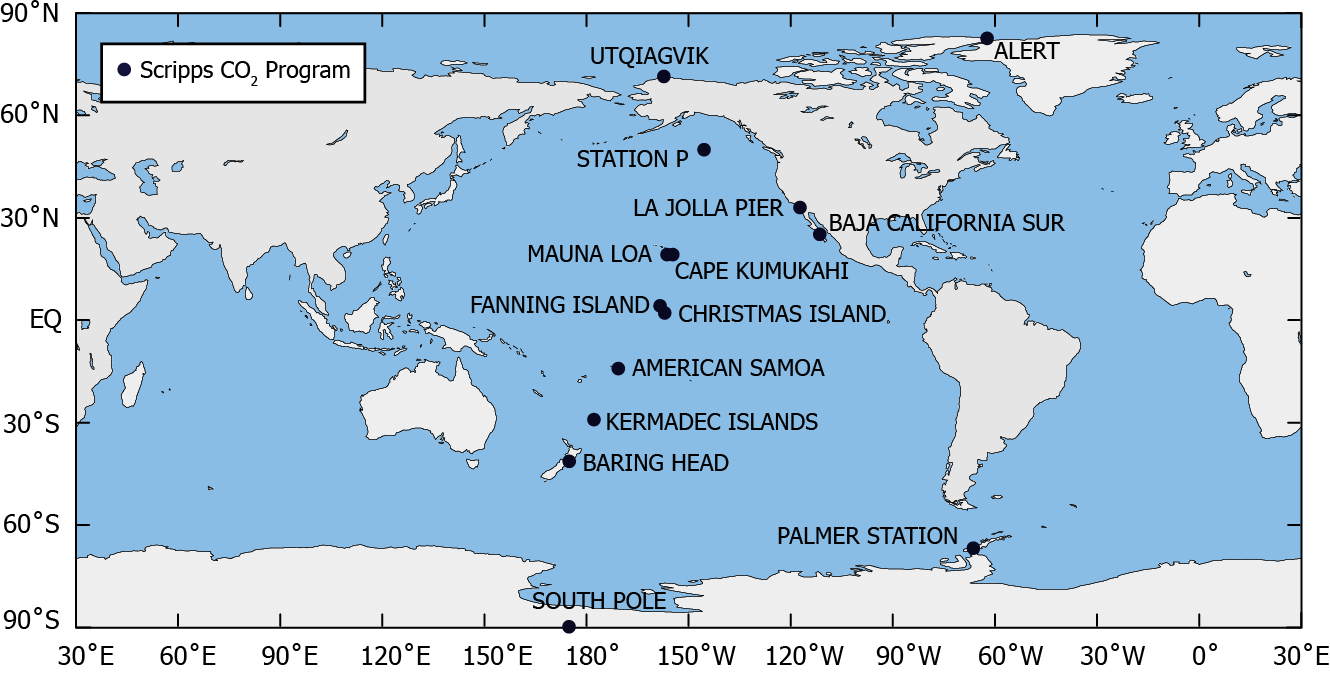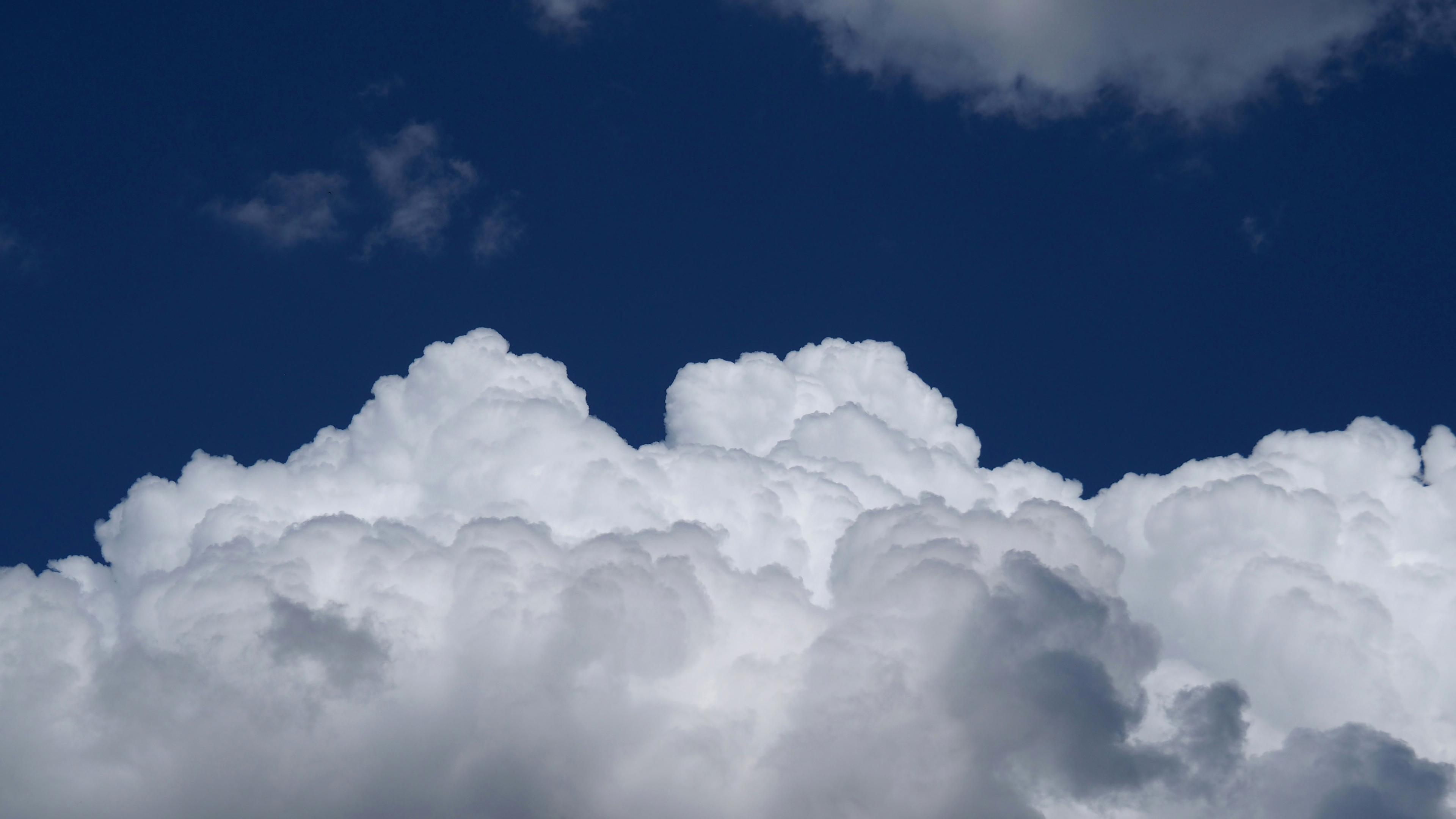Atmospheric CO2 Data
Sampling Station Records

Active Stations
| Station Name | Station Code | Latitude | Longitude | Elevation (m) | Dates |
|---|---|---|---|---|---|
| Alert, NWT, Canada | ALT | 82.3 °N | 62.3 °W | 210 | 1985 - present |
| Utqiagvik (formerly Barrow), Alaska | PTB | 71.3 °N | 156.6 °W | 11 | 1961 - present |
| La Jolla Pier, California | LJO | 32.9 °N | 117.3 °W | 10 | 1957 - present |
| Mauna Loa Observatory, Hawaii | MLO | 19.5 °N | 155.6 °W | 3397 | 1958 - present |
| Cape Kumukahi, Hawaii | KUM | 19.5 °N | 154.8 °W | 3 | 1979 - present |
| Fanning Island | FAN | 3.9 °N | 159.4 °W | 3 | 1977 - present |
| Christmas Island | CHR | 2.0 °N | 157.3 °W | 2 | 1974 - present |
| American Samoa | SAM | 14.2 °S | 170.6 °W | 30 | 1981 - present |
| Kermadec Island | KER | 29.2 °S | 177.9 °W | 2 | 1982 -present |
| Baring Head, New Zealand | NZD | 41.4 °S | 174.9 °E | 85 | 1977 - present |
| South Pole | SPO | 90.0 °S | 2810 | 1957 - present |
Legacy Stations
| Station Name | Station Code | Latitude | Longitude | Elevation (m) | Dates |
|---|---|---|---|---|---|
| Station P | STP | 50.0 °N | 145.0 °W | 0 | 1969 - 1981 |
| Baja California Sur, Mexico | BCS | 23.3 °N | 110.2 °W | 4 | 1997 - 2009 |
| Palmer Station, Antarctica | PSA | 64.9 °S | 64.0 °W | 10 | 2005- 2007 |
Citation
Please cite as:
C. D. Keeling, S. C. Piper, R. B. Bacastow, M. Wahlen, T. P. Whorf, M. Heimann, and H. A. Meijer, Exchanges of atmospheric CO2 and 13CO2 with the terrestrial biosphere and oceans from 1978 to 2000. I. Global aspects, SIO Reference Series, No. 01-06, Scripps Institution of Oceanography, San Diego, 88 pages, 2001.
If it is necessary to cite a peer-reviewed article, please cite as:
C. D. Keeling, S. C. Piper, R. B. Bacastow, M. Wahlen, T. P. Whorf, M. Heimann, and H. A. Meijer, Atmospheric CO2 and 13CO2 exchange with the terrestrial biosphere and oceans from 1978 to 2000: observations and carbon cycle implications, pages 83-113, in "A History of Atmospheric CO2 and its effects on Plants, Animals, and Ecosystems", editors, Ehleringer, J.R., T. E. Cerling, M. D. Dearing, Springer Verlag, New York, 2005.
Usage Restrictions
Scripps CO2 program data and graphics on scrippsco2.ucsd.edu are licensed under a CC BY license, Creative Commons Attribution 4.0 International License (http://creativecommons.org/licenses/by/4.0/), which clarifies appropriate uses and requirements, including that credit be given to the Scripps Institution of Oceanography at UC San Diego. Some products from this site incorporate data from sources external to the Scripps CO2 program, as indicated. Additional credit must be given for these products, as appropriate for that source.
Ethical usage may also require disclosing intentions at early stages to avoid duplicating ongoing studies at Scripps or elsewhere. For applications supporting peer-reviewed scientific publications, coauthorship may sometimes be appropriate. An example would be if an important result or conclusion depends on this product, such as the first account of a previously unreported phenomenon.
Please direct queries to Ralph Keeling (rkeeling@ucsd.edu)
